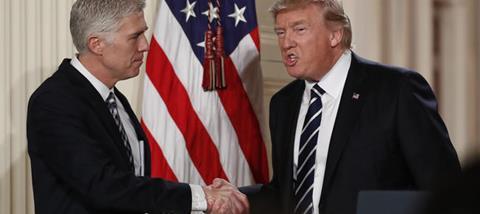
Politicians are often criticised for promising one thing then delivering another. While Trump’s record is far from perfect, even his critics must acknowledge the President has spent much of the past 12 days signing executive orders which put policies he mentioned on the campaign trail right into action.
He’s reiterated his desire to build a wall along the Mexican border. He’s prevented Muslims from entering the USA by banning citizens of seven Muslim-majority nations. And he’s stopped federal money going to international groups who perform or provide information on abortions.
Yesterday Trump delivered on another campaign promise. He appointed a conservative judge – Neil Gorsuch - to the Supreme Court.
The news that Gorsuch is a Christian, attends an Episcopal church in Colorado and is pro-life will delight the 70% of evangelicals who listed Supreme Court appointments as a concern before the election. For some American Christians, the people who sit in the Supreme Court are as important to their nation’s future as whoever sits in the White House. Given that Supreme Court justices are appointed for life while Presidents only enjoy four year terms, giving Trump power is arguably a price worth paying if the result is getting a judge who agrees with US evangelicals’ values into the highest court in the land.
Why it matters
While individual states can set their own laws in many areas, the Supreme Court has ultimate jurisdiction over all states. Prior to 2015, gay marriage was illegal in a minority of states. But once the Supreme Court ruled, access to same sex marriage became the right of every person in every state.
US Evangelicals have grown tired of losing key cases at the highest level. It was the Supreme Court that made abortion legal everywhere in a 7-2 majority as a result of the infamous Roe vs Wade case. That was back in 1973, yet abortion continues to be a hot topic in the US.
On the issue of religious freedom, the court’s only Protestant judge could have real influence.
More recently, Christians have raised concerns about religious freedom. Some evangelicals feel their legitimate rights are being threatened by wider society, while wider society often counters with the argument 'we have rights too'. The UK has witnessed this phenomenon of competing rights with last year’s 'gay cake' case in Northern Ireland. A person has the right to ask a bakery for a cake to be baked with a pro-gay marriage slogan. But the person working in the bakery has the right to be against gay marriage for religious reasons. Should the Christian be forced to bake the cake regardless of their views? Whose rights win? These are likely to be the kinds of difficult questions the Neil Gorsuch and the other justices will have to wrestle with and rule on.
There’s already been speculation from one US political magazine that Neil Gorsuch is "inclined to a more expansive view of what laws ‘freedom of religion’ frees you from." Gorsuch does have a track record of erring on the side of defending a person's religious freedom when it clashes with another law. (See his views on the Hobby Lobby case)
Gorsuch’s influence
Gorsuch won’t be able to turn back time. It’s unlikely the Supreme Court will make a major U-turn on either abortion or same sex marriage. But on the issue of religious freedom, the court’s only Protestant judge could have real influence. Once Gorsuch is appointed, the balance of power in the Supreme Court will be tipped. The court's 5-4 conservative majority will be restored.
In a speech last spring, Gorsuch spoke of how he agreed with his predecessor in the Supreme Court, the late Antonin Scalia that "text, structure and history" should be used in order to understand the law. Gorsuch said judges should "not decide cases based on their own moral convictions or the policy consequences they believe might serve society best".
Neil Gorsuch is expected to hear around 80 cases each year. We don’t know what the nature of those cases will be or what impact they will have on America. But we do know that whether you’re a pro-life group (National Right to Life), the President of ethics and religious liberty commission of the Southern Baptist Convention (Russel Moore) or a veteran evangelical commentator (Dr James Dobson), if you’re an American Christian, the chances are you’re delighted with this appointment.
When Franklin Graham (son of Billy Graham) was asked before the election about his political views, he said two things. First he said, "I think it all boils down to the Supreme Court". Then he said, "You may have to hold your nose and vote". Large numbers of American evangelicals followed Graham’s advice. They held their nose. They voted Trump in order to get Gorsuch. Now, given Trump's other policies, they must ask, 'was it worth it?'
Click here to request a free copy of Premier Christianity magazine




























